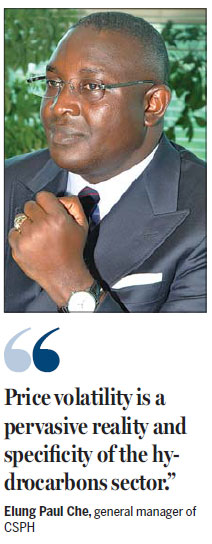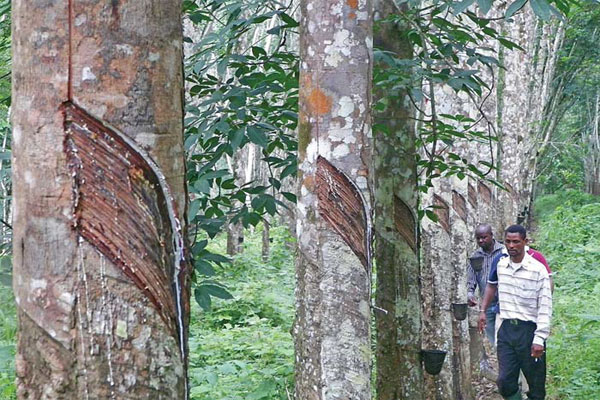Africa's sleeping giant awakens
|
A rubber plantation of the major agroindustrial company Pamol Plantations Plc. Photos provided to China Daily |
Country focuses on strong socioeconomic development
Blessed with a diverse portfolio of natural resources including oil and gas, minerals, timber and agricultural products such as coffee, cocoa, cotton and maize, Cameroon is one of Africa's economies with the highest potential.
The country of 23.5 million has consistently posted single-digit annual economic growth and is an increasingly attractive destination for foreign direct investment.
China is the country's largest foreign direct investor, accounting for two-thirds of the tens of billions of dollars that have arrived since the turn of the millennium.
Although less reliant on oil than several energy export-oriented neighbors, Cameroon has seen its fiscal performance hurt by the recent fall in crude oil prices and other commodity prices such as precious metals. However, a drive towards economic diversification has been compensated to a large degree by solid growth in sectors like financial services, telecommunications, transport and tourism.
Strong political, social and economic foundations mean Cameroon is well-positioned to capitalize on its many natural and human resources as part of a drive for economic emergence.

Vision 2035
Cameroon's comprehensive blueprint for strong and sustained socioeconomic development, called Vision 2035, is expected to boost living standards and generate thousands of jobs.
Launched by President Paul Biya, the bold plan aims to transform the country into one that creates and distributes wealth fairly, as well as offers equal development opportunities to all and enhances food security.
"The challenges are immense and meeting them requires total and unwavering commitment from all Cameroonians in towns and villages, within and outside the country," Biya said. "Economic emergence also requires opening up to partners and foreign investors willing to support our development.
"Major structural projects being executed throughout the country are key levers. The other face of this great mobilization focuses on agriculture, mining, oil and gas, environmental protection and related industries, services of high economic value, especially in finance, insurance, information and communication technologies and, broadly speaking, the digital economy. These major sectors are promising for our youth and for the country."
In January, Biya hosted a high-profile dinner in the capital Yaounde for government ministers, local dignitaries and representatives of the International Monetary Fund. Addressing an audience that included IMF Managing Director Christine Lagarde, he highlighted the progress made in recent years as the country strives to achieve its Vision 2035 goals.
"Over the last five years, despite a difficult global context, Cameroon has been able to maintain a relatively significant level of growth," Biya said.
"This has been achieved thanks to our increasingly diversified economy. Our ultimate goal is to achieve strong, lasting and inclusive growth, which would generate the desired impact on the quality of life, leading to attainment of the status of an emerging economy by 2035.
"I have prescribed profound reforms to enable us to make the most of our country's abundant natural resources. We are constantly striving to make our debt burden more viable, more productive and more sustainable."
In response, Lagarde reaffirmed her organization's firm commitment to Cameroon and commended officials on a "resilient economic performance under trying circumstances".
"Authorities are taking strong steps to secure macroeconomic stability and build strong and inclusive growth," she said during the gala dinner at the Unity Palace.
Relations with China
One of Cameroon's most important economic partners is China and the countries enjoy excellent bilateral political, diplomatic, trade and economic ties. China is financing a range of important infrastructure and energy projects, including the Kribi Deep Sea Port, the Lom Pangar, Mekin and Memve'ele dams and hydroelectric plants, as well as several major road-building programs.
In June 2015, Chinese President Xi Jinping hosted a meeting with the Cameroon Prime Minister Philmon Yang in Beijing where they discussed ways to further enhance economic cooperation. Yang said Cameroon hopes to further cement bilateral relations and boost cooperation in industry, raw material processing, infrastructure, education, and science and technology.
The Cameroonian government will take further measures to provide more convenience and conditions for foreign investors, he added.
Yang also held productive talks with his Chinese counterpart, Premier Li Keqiang. Li suggested the two sides should work hand-in-hand to enhance cooperation in high-potential areas such as manufacturing and technology to accelerate industrialization. "China is willing to work with Cameroon to promote cooperation in civil aviation, agriculture and human resources development, in a bid to upgrade the mutually beneficial cooperation between the two nations," Li said.
Created after the first global oil crisis several decades ago, Caisse de Stabilisation des Prix des Hydrocarbures (CSPH) is a public institution with legal entity and financial autonomy operating under the supervision of the Ministry of Trade in Cameroon. Known in English as the Hydrocarbons Prices Stabilization Fund, it regulates prices of petroleum products by providing partial or complete subsidies.
Elung Paul Che, general manager of CSPH, said: "We ensure prices are stable and regulated. Volatility is a pervasive reality and specificity of the hydrocarbons sector."
InFocus provided this story
(China Daily 04/11/2016 page5)















